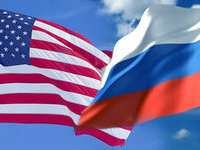Should Russia forgive USA's debt of $315bn and sell Arctic?
Deja vu: Yeltsin on the eve of the 1998 default vowed that nothing like this would happen. A day later Russia has refused to pay its debts. Today we observe the same situation where liberal economists in the government headed by A. Kudrin swore that there was nothing safer than U.S. Treasury. In ten days the U.S. is likely to refuse to pay its bills.

The common denominator in the situation 15 years ago in Russia and the looming disaster in the United States is the implementation of the market principles in the primitive monetarist version. 40 percent of Gross Domestic Product in the U.S. is generated by the financial sector, that is, almost half of it is a bubble with no real material content. The money is there, but there is no appropriate volume of goods. The same thing has happened during the monetary mayhem in the 1990s in Russia, when the most striking example was the story of MMM, later reproduced in the "pyramid" of government treasury bills of Russia that has collapsed in August of 1998.
The U.S. has been living beyond its means ever since the late 1990s, increasing its spending and covering the budget deficit by issuing treasury bills. Since the mid-2000s when Russia saw an inflow of export revenues as oil became more expensive, the then Deputy Prime Minister Alexei Kudrin insisted on investing the proceeds not in the development of the domestic industries but purchasing the U.S. securities. His rationale was that this is the most reliable paper in the world, while Russian industrialists would steal if given the money. Since then, the offensive and false mantra has been repeated by all liberal economists famous for their crystal honesty, from Anatoly Chubais and Yasin to A. Koch and Boris Nemtsov.
Today, the United States owes Russia, according to various estimates, from $157.6 to $315 billion. The estimates vary because in the last few years there has been no official data. But in any event, the amount is significant and not negligible for the Russian economy. This economy, unable to withstand many years of liberal experiment, is sliding into a systemic crisis.
It will be quite problematic to get these billions. Many experts believe that the republican "McCain" majority in the U.S. Congress refused to fund government spending in an attempt to punish President Barack Obama for his failure to attack Syria, regardless of Russia's peace initiatives.
There is also a historical precedent. 17 years ago Democratic President Clinton who refused to meet the recommendations of the Republicans led by Bush Jr. to bomb Iraq was in a similar situation. However, at the time the U.S. did not have such a catastrophic foreign and domestic debt. Now the Republicans have a powerful leverage over the Democratic President. On October 17, Congress is likely to vote to not increase the debt ceiling and the U.S. will be forced to declare a technical default by refusing to pay its obligations on time.
Without doubt, the Russian money invested in the U.S. Treasuries will not completely disappear. There will be processes familiar to Russian investors who invested in MMM and dozens of failed banks. There will be restructuring, discount, long talks about the order of payment, refusal to pay penalty interest, and so on.
The question is who in Russia will assume responsibility for such a massive loss not comparable with any major theft? The people of Russia were robbed off hundreds of billions, each resident, including infants, has lost at least a thousand dollars. The initiators and perpetrators are well known. It is, first of all, "the best finance minister" of the recent past Kudrin and the entire group of Russian liberal monetarists leaning on their ideological center - the State University - Higher School of Economics.
It seems that there is no more eloquent assessment of monetarism in Russian performance than the real possibility of losing large sums of money. What else has to happen to finally fundamentally change the economic policy? Probably, the Arctic should be sold or transferred under foreign control, as recently proposed, and even justified by a professor of HSE Sergei Medvedev. It will be even more significant than the squandered American treasuries.
Yuri Skidanov
Pravda.Ru
Subscribe to Pravda.Ru Telegram channel, Facebook, RSS!


